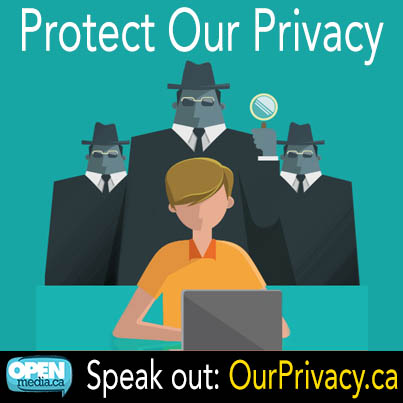It’s been a busy few months on privacy issues here at OpenMedia. Our small team has been campaigning hardon your behalf to secure effective legal protections that safeguard the privacy of every resident of Canada.
Recently we’ve seen a number of disturbing stories come to light that underline just how important this campaign is. It can sometimes be difficult for everyday Canadians to see privacy as an issue that impacts their everyday lives — when in fact the human consequences of privacy breaches can be immense.
Here are just a few concrete examples of Canadians who’ve had their lives turned totally upside down because of this government’s privacy deficit.
1. ANDREW — Toronto businessman blocked from travelling due to dropped accusation from 25 years ago:
Andrew, a 42-year-old Toronto businessman, was on his way to a professional conference in the United States last year, when he was denied entry by a U.S. border guard at Toronto’s Pearson airport. The reason will astound you — Andrew was told it was because of a dropped accusation from over 24 years ago. In 1990, while still in high school, Andrew was investigated but never even charged with possessing marijuana.
A record of the investigation was still kept on the police database, despite his never being charged with an offence. It appears that these sensitive private records were shared, without Andrew’s knowledge or consent, with U.S. immigration authorities, resulting in devastating consequences to Andrew’s professional career. Now he’s unable to visit his many U.S.-based clients.
2. DIANE — Law-abiding Canadian has professional life undermined following privacy breach:
Diane is one of over 200 Canadians who recently approached the Toronto Star to say their personal or professional lives have been ruined by police disclosures despite their never breaking the law. In Diane’s case she was the victim of a false accusation a number of years ago. The charges were dropped but, despite this, police not only retained records on her, but shared them, without Diane’s consent, with a potential employer. She says it took “many hours of anguish” to finally convince police to remove her record and she still lives in fear that these allegations will resurface and restrict her future career opportunities.
3. ELLEN — Woman suffering from depression blocked from entering U.S. after her private medical records were handed to U.S. authorities:
Toronto author Ellen Richardson was all set for the holiday of a lifetime last year — a Caribbean cruise for which she had paid $6,000. She was shocked to be denied entry by a U.S. border guard at Pearson Airport. The U.S. official told her this was because she was hospitalized for depression in 2013. Ellen was, understandably, astounded — and now Ontario’s privacy watchdog is looking into just how her sensitive medical information was handed to U.S. authorities and whether the police may have been involved.
4. LOIS — among over a dozen Canadians living with mental illness blocked from entering the U.S.:
Ellen Richardson isn’t the only Canadian to be denied entry to the U.S. due to a private medical condition. Toronto’s Lois Kamenitz found herself in a similar position, and was blocked from entering the U.S. following a suicide attempt many years prior. In fact, over a dozen Canadians complained to Ontario’s Psychiatric Patient Advocate Office after Canadian authorities shared their private medical information with U.S. officials. This was done without the consent or even knowledge of the individuals affected — often, the first time a victim learnt that their privacy had been breached was when they were interviewed at U.S. border control.
So, where does this leave us?
These are just a few examples, but they lay bare the human cost of Canada’s privacy deficit. There’s a common thread to all these cases: government authorities are collecting personal information on hundreds of thousands of Canadians and then handing it over to third parties, including, most concerningly, U.S. authorities who are not subject to Canadian privacy law.
As Ontario Privacy Commissioner Ann Cavoukian starkly points out, “this ruins lives.” And, according to the Toronto Star, there are over 420,000 Canadians who have their information in a police database despite never being convicted — meaning you or one of your loved ones could easily be among the next victims.
Responsibility for this careless government attitude to our private data rests squarely on the shoulders of Justice Minister Peter MacKay. Despite the real harm being inflicted on Canadians, Minister MacKay remains oblivious to calls to improve our privacy laws. Instead he’s moving in the opposite direction, continuing to push reckless online spying legislation (Bill C-13) despite opposition from three quarters of Canadians and a historic Supreme Court ruling that suggests much of the bill is unconstitutional.
Sadly, Minister MacKay’s lack of respect for Canadians is symptomatic of a government with a terrible track record on privacy issues. They continue to resist calls to take common sense steps to rein in Canada’s out-of-control spy agency CSEC — an agency that just 8 per cent of Canadians trust with their private information, according to a recent poll. Journalist Glenn Greenwald recently revealed that CSEC was caught red-handed collecting hugely sensitive information about law-abiding Canadian air travellers, and storing our private information in giant, insecure databases to be shared with their U.S. partners at the NSA.
When will the government finally start listening to Canadians and make sure we all have the protections we deserve? You can keep up the pressure by pledging your support for the Privacy Coalition at OurPrivacy.caand by sending a letter to the editor of your local newspaper at OpenMedia.ca/Letter. With privacy shaping up to be a key issue in the upcoming federal election, it’s never been more important to speak up.



